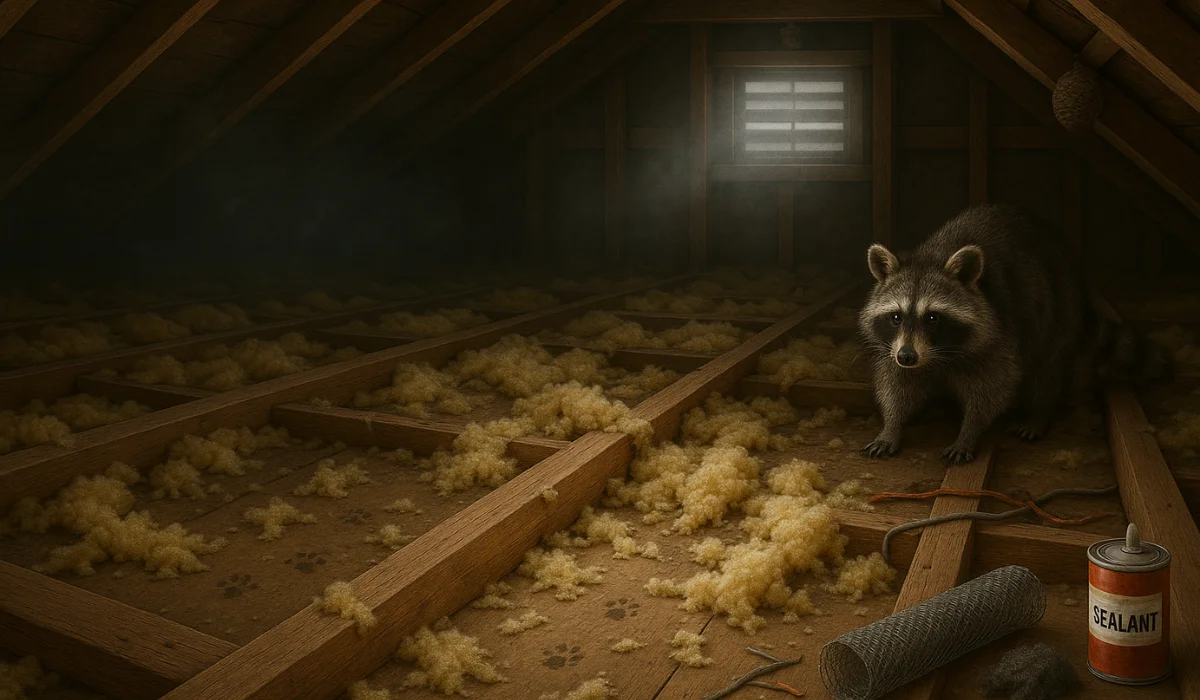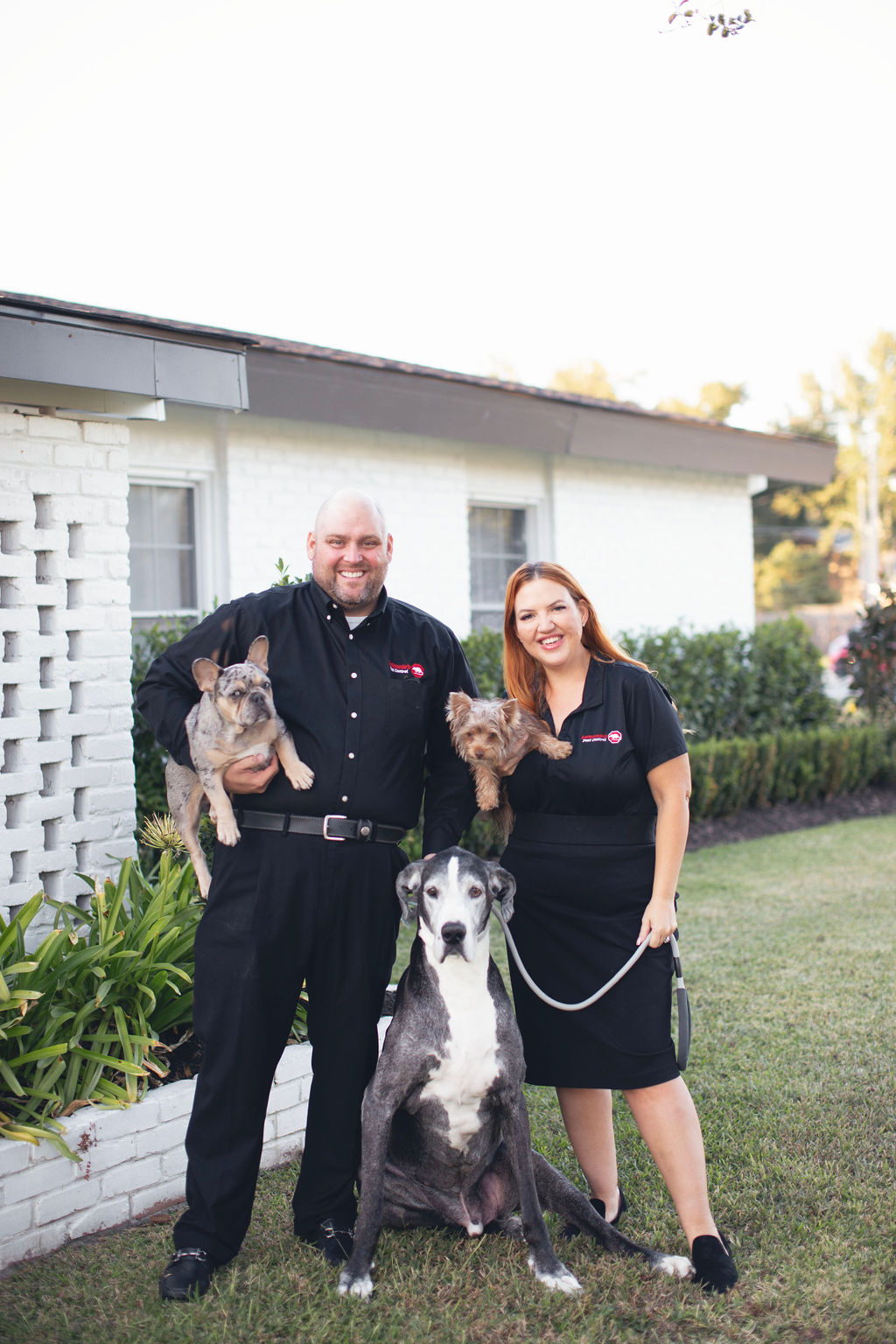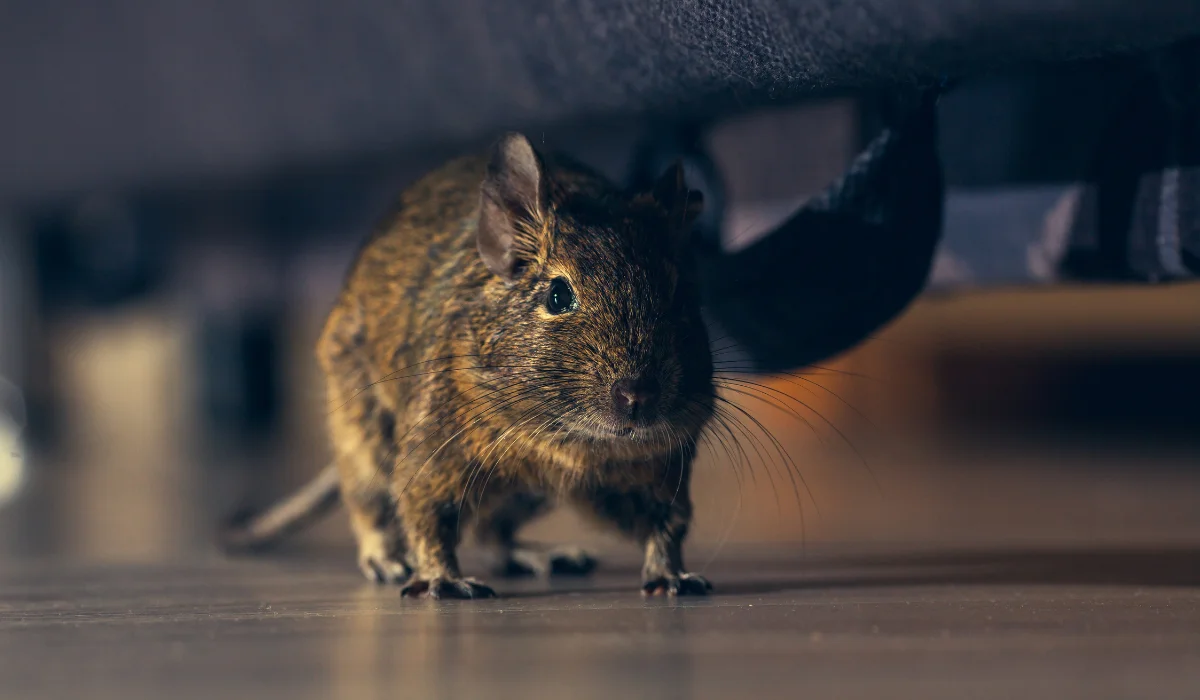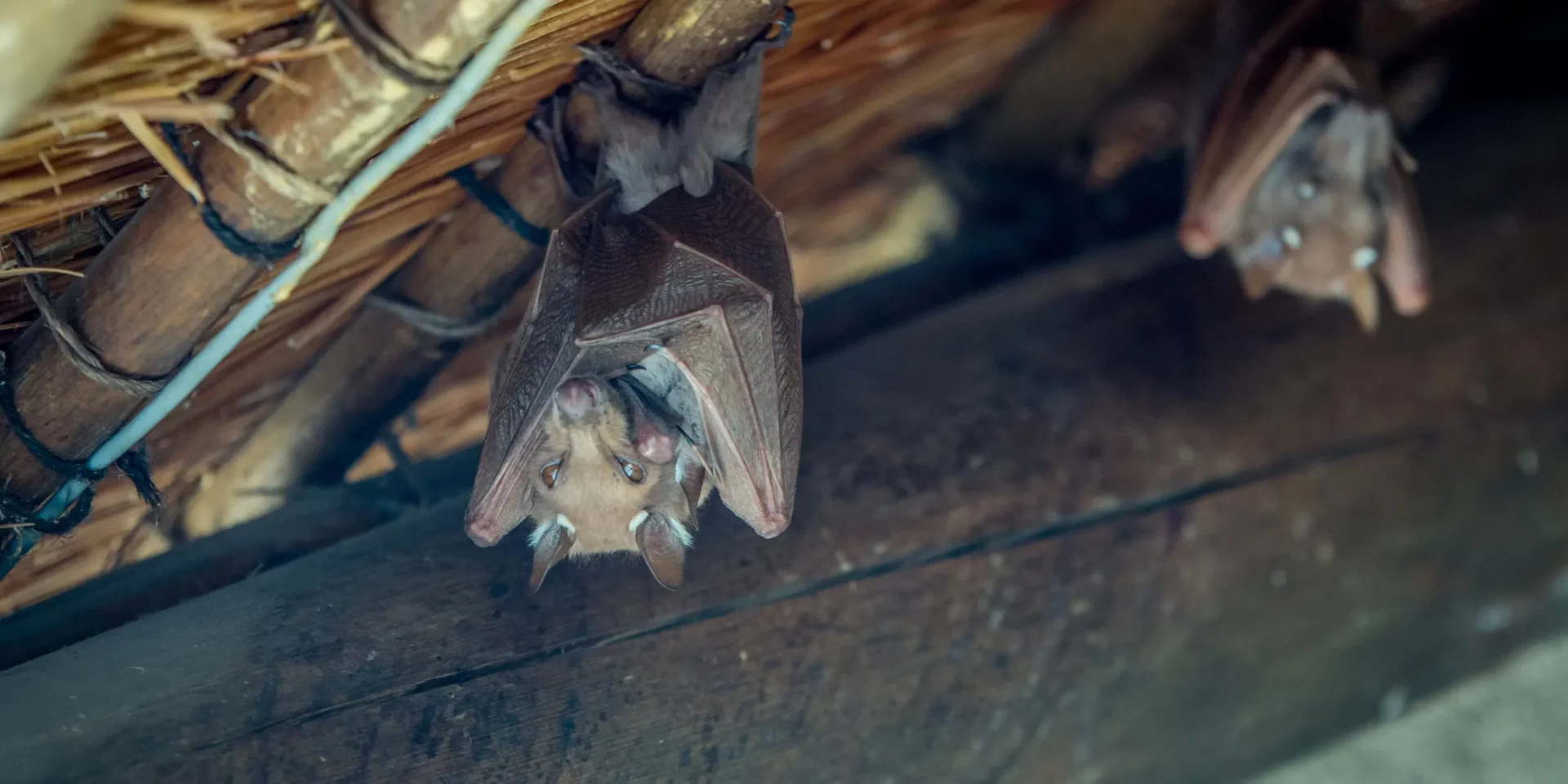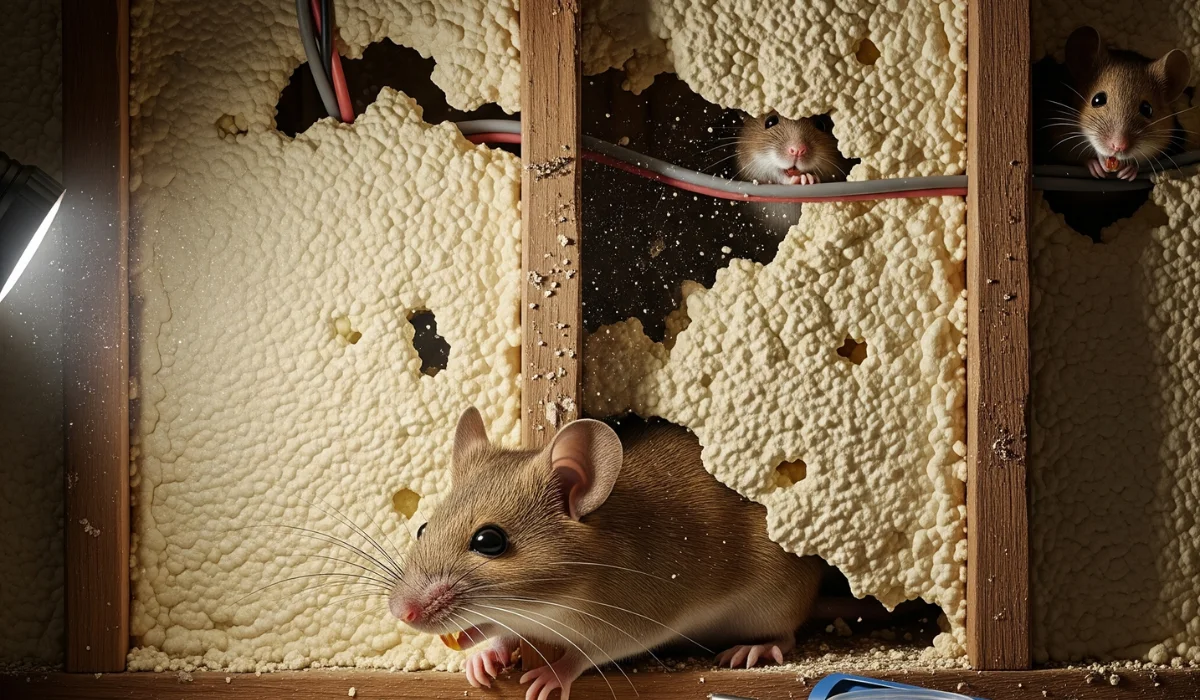Raccoons may look harmless, but once they get into your attic, the damage and cleanup costs add up fast, especially in Louisiana homes. Many Louisiana homeowners discover too late that raccoons tear through attic insulation while seeking warmth, nesting material, or a safe place to raise young.
Damaged attic insulation raises energy bills and creates health risks from droppings and urine.
If raccoons are in your attic insulation in Louisiana, act quickly and consider professional raccoon removal to get rid of raccoons before the damage spreads. The longer you wait, the larger the infestation becomes. In Baton Rouge, Thibodaux, and New Orleans, raccoon removal is one of the most common wildlife control calls LaJaunie’s Pest Control receives.
Key Takeaways
• Raccoons in Louisiana homes destroy attic insulation by nesting and leaving behind contaminated droppings.
• Infestations pose health risks, including exposure to raccoon roundworm.
• Prevention involves sealing entry points, securing garbage cans, and scheduling inspections.
• Professional wildlife removal and attic restoration are the safest methods for removing raccoons and repairing the resulting damage.
Why Raccoons Target Attic Insulation
Raccoons tear into attic insulation for nesting and warmth. Louisiana’s hot summers and damp winters make attic insulation attractive to wildlife seeking shelter. When they get inside, raccoons compress and shred insulation and leave feces that may carry raccoon roundworm and other parasites.
Infestations often start at roof gaps, soffits, loose shingles, or torn vents. After gaining entry, they use insulation as nesting material for their young. Over time, this weakens your attic’s ability to regulate temperature and lets odors spread into living spaces.
If you notice droppings or hear scratching at night, schedule professional wildlife removal before the problem grows.
Health Risks Linked to Raccoon Infestations
Raccoon feces can contain raccoon roundworm, a parasite that can harm people and pets. Airborne particles from droppings and urine can contaminate your attic and crawl space. DIY cleanup without proper protection exposes you to dangerous germs.
Raccoons also bring nesting material that can attract other wild animals, such as skunks, opossums, and rodents. Delays make future pest control harder and more costly.
Professional wildlife control experts safely remove contaminated insulation and restore your attic to a healthy state.
How to Prevent Raccoons From Entering Your Attic
The best protection is prevention: block raccoons before they enter your property. Start by sealing all entry points. Older homes in areas like New Orleans often have gaps in soffits, shingles, or vents that raccoons exploit.
Discourage raccoons by securing garbage cans, keeping pet food indoors, and trimming branches that reach the roof. Reduce food and shelter sources to make your home less inviting to wildlife and other critters that may be searching for shelter.
Regular inspections from a pest control company help spot vulnerable areas before raccoons, opossums, or other wildlife turn them into a nesting site.
Wildlife Removal and Attic Restoration in Louisiana
If raccoons are already in your attic insulation, professional wildlife removal is the safest and most effective solution. At LaJaunie’s Pest Control, our technicians start with a detailed home inspection. We find entry holes, remove raccoons, and seal problem areas with proven wildlife exclusion methods.
After removal, our attic restoration team handles cleanup. We remove soiled insulation, sanitize the space, and install new insulation. Many Louisiana homeowners choose TAP (Thermal, Acoustical, Pest) insulation because it improves energy efficiency and resists small pests.
Whether you’re in Baton Rouge, New Orleans, or nearby towns, our wildlife removal services protect your home year-round.
Why DIY Raccoon Control Doesn’t Work
Some homeowners try DIY traps or repellents, but raccoons are persistent. They often return through new or missed entry points, especially if baby raccoons are still inside. Trapping without sealing entry points leads to repeat infestations.
DIY cleanup also carries serious risks. Raccoon feces may contain roundworm eggs that can stay infectious for years. Without proper protective gear, you could expose yourself to serious illness. That’s why experts recommend professional wildlife removal and attic sanitation.
Raccoon Problems in Baton Rouge and New Orleans
Urban areas like Baton Rouge and New Orleans have high raccoon activity because easy food sources, such as garbage cans and pet bowls left outside, are familiar. Homeowners often find damage after raccoons pull out insulation to build dens.
LaJaunie’s offers same-day wildlife removal in these areas, bringing quick relief from noise, odors, and health risks.
Making the Right Choice for Wildlife Removal in Louisiana
Raccoons in your attic insulation can quickly turn into a serious wildlife problem, leading to expensive repairs, unpleasant odors, and health risks if ignored. LaJaunie’s Pest Control provides trusted solutions across Louisiana, combining removal, cleanup, and prevention to keep your home safe.
Ready to protect your attic and restore comfort to your home? Contact us today to schedule your inspection.
FAQs
How can I tell if raccoons are in my attic insulation?
You may hear scratching or thumping at night, notice droppings, or find damaged insulation. A professional inspection can confirm the presence of raccoon activity.
Are raccoon feces dangerous to clean on my own?
Yes. Raccoon feces may contain raccoon roundworm, which is hazardous to humans and pets. Call professional wildlife removal services for safe cleanup.
Does LaJaunie’s Pest Control offer attic restoration after raccoon removal?
Yes. Our attic restoration service includes removing soiled insulation, sanitizing the space, and installing new insulation to restore your attic safely and effectively.
 By: LaJaunie's Pest Control
By: LaJaunie's Pest Control 